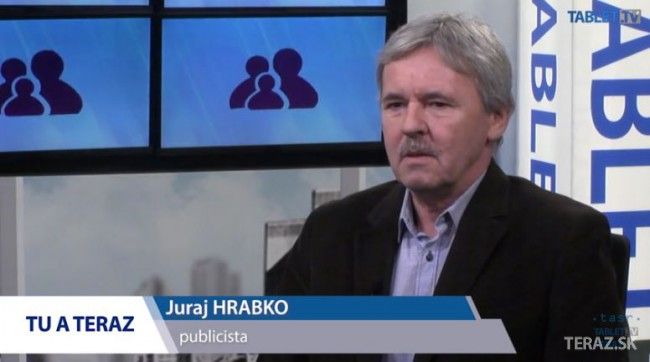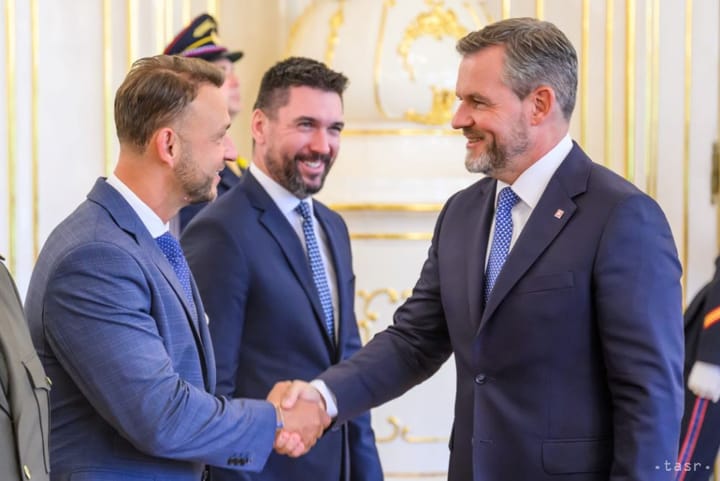Hrabko: Fico, Danko and Bugar Make Up Coalition, Not Indivisible Family

Bratislava, August 10 (TASR) – The decision of the Slovak National Party (SNS) chair Andrej Danko to withdraw from the coalition agreement without SNS also automatically forfeiting its status of a coalition partner is unprecedented in Slovakia and not really in proportion to the problems SNS is facing, publicist Juraj Hrabko told TABLET.TV on Thursday.
Earlier in the day, SNS first vice-chair Jaroslav Paska intimated that the distribution of state administration posts in regions didn’t go down as agreed during coalition negotiations. Paska also voiced suspicion that the European funds scandal was initiated by people from the “Government’s Office in cahoots with OLaNO-NOVA” with an eye towards discrediting SNS.
“I understand Jaroslav Paska when he talks about filling posts, but I fail to understand the second thing he broached. He claimed that they [SNS] are under impression that this [discreditation campaign] is directed against them, courtesy of the Government’s Office,” said Hrabko. “Jaroslav Paska talks about the impression, but such serious steps are not taken based on impressions alone.”
The competition for voters is ongoing throughout the entire elected term – even between coalition parties. “It’s understandable. After all, [Prime Minister] Robert Fico has his own party and [Most-Hid chair] Bela Bugar has his own party – they’re not one big indivisible family. Everyone is trying to snatch away votes from everyone else, throughout the entire elected term. Even Andrej Danko must be aware of that,” claimed Hrabko.
The practical effect of SNS’s unilateral withdrawal from the coalition agreement is that the Government will no longer be able to assert that it’s stable – a myth that was nurtured for a long time. Hrabko believes that fundamental changes are not likely to arise, however.
“Politically-wise, it doesn’t mean anything – just that there is a dispute inside the coalition. This doesn’t spell the end for the coalition – something a lot more drastic would have had to happen for that,” he said. “I don’t understand why Andrej Danko did it [the announcement] this way. He didn’t inform anyone beforehand, not even Bela Bugar, with whom he has enjoyed friendly ties lately.”
According to Hrabko, Danko undermined his own credibility with his decision. “If we take this seriously, it’s no small matter to withdraw from the coalition agreement. KDH [Christian Democratic Movement] did it back in their day [in 2006, as a junior coalition partner serving in the second government of Mikulas Dzurinda – ed.note]. Subsequently, KDH withdrew all of its ministers and left the government, with [then-chair] Pavol Hrusovsky instantly tendering resignation from the post of the parliamentary chair,” reminisced Hrabko. “There is also another example. [Freedom and Solidarity/SaS chair] Richard Sulik had to be ousted from the post of parliamentary chair because he didn’t want to go on his own [in 2011, after SaS let the government of Iveta Radicova (2010-12) collapse in the no-confidence vote linked with the vote on European bailout -ed.note]. The ministers [of SaS] remained in their posts, [defence minister] Lubor Galko exercised the powers of his office even after the president dismissed him. So, the history offers various examples, yet Andrej Danko came up with the new way. He withdrew from the coalition agreement, yet wants to remain part of that coalition.”
“If they wish to remain in power, they’ve got no choice but to arrive at an agreement. Otherwise, snap election will ensue and they can easily calculate in whose favour that early election might work,” stressed Hrabko.
Although SaS declared its readiness to accept government responsibility and the snap election, Hrabko dismissed such claims as an empty rhetoric, seeing as he doesn’t find the current opposition capable of taking advantage of the Government crisis. “In this situation, I don’t see any party willing and capable to replace any of the existing coalition partners,” he concluded.



